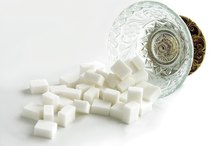Primary Sclerosing Cholangitis Diet
Primary sclerosing cholangitis is an inflammatory disorder of the bile ducts inside and outside the liver 1. The inflammation causes scarring and hardening that narrows these ducts. The disease may also affect ducts of the gallbladder and pancreas. Diet changes can help decrease the inflammation, according to Dr. Sandra Cabot, author of the 1997 book "The Liver Cleansing Diet."
If you are experiencing serious medical symptoms, seek emergency treatment immediately.
The Disorder
When bile ducts become narrowed, bile cannot drain effectively and it can accumulate in the liver and damage liver cells, explains Jackson Siegelbaum Gastroenterology. The ducts may become infected, resulting in fever, chills and tenderness in the upper abdomen. If bile leaks into the bloodstream, itchiness may develop. Disease progression can cause chronic fatigue, loss of appetite, weight loss and jaundice. Long-term liver cell damage can lead to cirrhosis, a hardening of the liver that prevents it from functioning properly.
- When bile ducts become narrowed, bile cannot drain effectively and it can accumulate in the liver and damage liver cells, explains Jackson Siegelbaum Gastroenterology.
- The ducts may become infected, resulting in fever, chills and tenderness in the upper abdomen.
Beneficial Foods
Foods That Are Bad for Your Liver
Learn More
Many types of foods can help patients with primary sclerosing cholangitis, according to Cabot 1. She recommends eating as much raw food as possible and drinking raw vegetable juices that contain a combination of apples, beets, broccoli, carrots and celery. Cruciferous vegetables such as broccoli, cabbage and cauliflower support liver function and detoxification. Eating foods high in sulfur has an effect on toxins that makes them easier to excrete. These foods include eggs, garlic, legumes and onions. Rely on fresh or canned fish and organic poultry as good protein sources. Chicken and turkey should be free range and raised without growth hormones or antibiotics. In addition, drink 2 liters of water every day.
- Many types of foods can help patients with primary sclerosing cholangitis, according to Cabot 1.
- Cruciferous vegetables such as broccoli, cabbage and cauliflower support liver function and detoxification.
Foods to Avoid
Cabot recommends avoiding all cow's milk products and any foods containing gluten, which occurs naturally in wheat, barley and rye. In addition, do not eat fried or processed foods, preserved meats and all margarine and similar spreads. You should not drink alcohol or caffeinated beverages. Products containing refined sugar and flour, chocolate and artificial sweeteners also are off limits.
- Cabot recommends avoiding all cow's milk products and any foods containing gluten, which occurs naturally in wheat, barley and rye.
- In addition, do not eat fried or processed foods, preserved meats and all margarine and similar spreads.
Fat
How to Reduce a Fatty Liver
Learn More
Primary sclerosing cholangitis may decrease the flow of bile into the gut, which can prevent the digestion of fat 1. This leads to a type of fatty diarrhea called steatorrhoea. The British Liver Trust recommends eating less fat if this occurs. Don't eliminate fat from your diet altogether because some amount is essential for the absorption of the fat-soluble vitamins A, D, E and K.
- Primary sclerosing cholangitis may decrease the flow of bile into the gut, which can prevent the digestion of fat 1.
Supplements
Cabot recommends taking anti-inflammatory supplements to decrease bile duct inflammation caused by primary sclerosing cholangitis 1. These include vitamins C, E and natural beta-carotene. Another beneficial anti-inflammatory substance is selenium, according to Cabot, which you can obtain by consuming 2 tsp. daily of a yeast powder high in selenium.
- Cabot recommends taking anti-inflammatory supplements to decrease bile duct inflammation caused by primary sclerosing cholangitis 1.
- These include vitamins C, E and natural beta-carotene.
Related Articles
References
- LiverDoctor.com: Sclerosing Cholangitis
- Ahmed M. Acute cholangitis - an update. World J Gastrointest Pathophysiol. 2018;9(1):1-7. doi:10.4291/wjgp.v9.i1.1
- Bile Duct Obstruction. US National Library of Medicine. April 2018.
- Cholangitis. US National Library of Medicine. January 2020.
- Galeazzi M, Mazzola P, Valcarcel B, et al. Endoscopic retrograde cholangiopancreatography in the elderly: results of a retrospective study and a geriatricians' point of view. BMC Gastroenterol. 2018;18(1):38. doi:10.1186/s12876-018-0764-4
- Willis L. Professional Guide to Diseases (Professional Guide Series) Tenth Edition. LWW. 2012.
- Diagnosis of Primary Sclerosing Cholangitis. National Institute of Diabetes and Digestive and Kidney Diseases. January 2018.
- Percutaneous transhepatic cholangiogram. US National Library of Medicine. December 2018.
- Costamagna G, Boškoski I. Current treatment of benign biliary strictures. Ann Gastroenterol. 2013;26(1):37-40.
- What is Sepsis?. Centers for Disease Control and Prevention. August 2019.
- Njeze GE. Gallstones. Niger J Surg. 2013;19(2):49-55. doi:10.4103/1117-6806.119236
- Tierney J, Bhutiani N, Stamp B, et al. Predictive risk factors associated with cholangitis following ERCP. Surg Endosc. 2018:32;799. doi: 10.1007/s00464-017-5746-z
- Yeom DH, Oh HJ, Son YW, Kim TH. "What are the risk factors for acute suppurative cholangitis caused by common bile duct stones?" Gut Liver. 2010;4:363. DOI: 10.5009/gnl.2010.4.3.363
- Afdhal, NH. "Acute cholangitis." UpToDate. 18 Mar 2016.
- Centers for Disease Control and Prevention. "Sepsis." CDC.gov. 23 Jan 2018.
Writer Bio
Shelley Moore is a journalist and award-winning short-story writer. She specializes in writing about personal development, health, careers and personal finance. Moore has been published in "Family Circle" magazine and the "Milwaukee Sentinel" newspaper, along with numerous other national and regional magazines, daily and weekly newspapers and corporate publications. She has a Bachelor of Science in psychology.









